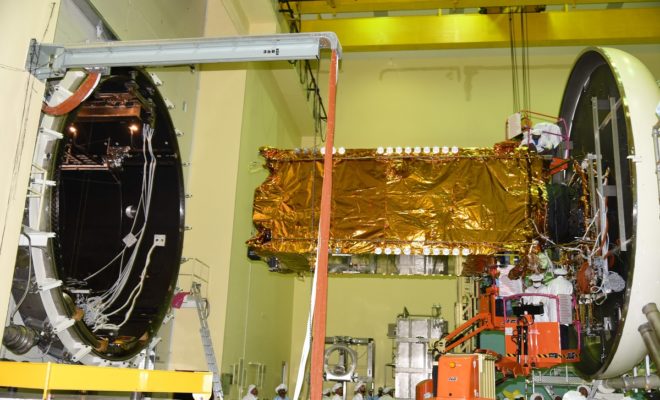India
ISRO’s Heaviest Satellite GSAT-11 Successfully Launched From French Guiana

Picture Courtesy: www.isro.gov.in
ISRO said the satellite will have an important role in providing broadband services across the length and breadth of India.
GSAT-11, touted to be India’s heaviest satellite, was successfully launched by an Arianespace rocket from the French Guiana early Dec. 5 morning. The satellite will help boost broadband services in the country.
The satellite was launched onboard the Ariane-5 rocket from the Ariane Launch Complex in Kourou, French Guiana, a French territory located along the northeastern coast of South America at 02:07 am (IST). The satellite reached its intended orbit 33 minutes after launch.
“…..the heaviest, largest and most powerful satellite ever built by India is successfully launched by Ariane-5 today,” Indian Space Research Organization (ISRO) Chairman K Sivan said soon after the launch.
Stating that GSAT-11 is going to be the “richest space asset” for India, he said, “the satellite has 38 spot beams as well as eight sub-beams, which would cover the entire country, including the remote places … it is going to provide something like 16 GBPS data link services to the country,” according to a PTO report.
Sivan said GSAT-11 is the third in a series of four satellites planned at achieving the government’s target of providing high data connectivity of 100 GBPS in the country under the Digital India Mission.
This is the heaviest satellite ever built by ISRO and weighs about 5,854 kg.
ISRO said that GSAT-11 is a “high throughput” next-generation communication satellite based on its I-6K Bus technology and will last more than 15 years.
ISRO also said that the satellite will be initially placed in the Geosynchronous Transfer Orbit and will be raised to the Geostationary Orbit by firing the on-board Liquid Apogee thruster.
Quoting ISRO, PTI said the GSAT-11 is the fore-runner in a series of advanced communications satellites with multi-spot beam antenna coverage over Indian mainland and islands.
ISRO said the satellite will have an important role in providing broadband services across the length and breadth of India. It will also be a platform for demonstrating new generation applications.
The satellite was initially planned for launch on May 25 but was postponed as ISRO wanted to perform additional checks.

You must be logged in to post a comment Login